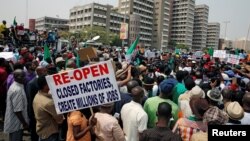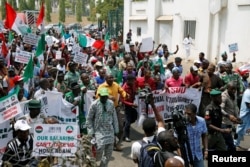More than 700 people took to the streets in the Nigerian capital Abuja on Thursday to protest against the government's economic policy in a sign of mounting public anger in the oil producer grappling with recession.
Africa's largest economy is mired in its first recession for 25 years as low oil prices have hammered public finances and foreign reserves while driving up annual inflation to almost 20 percent.
President Muhammadu Buhari was elected in 2015 on pledges to diversify the economy and fight corruption. But critics say he has made little progress, with Nigeria still heavily dependent on crude exports whose price has halved since 2014.
The 74-year-old former military ruler is currently on medical leave in Britain.
"The Buhari administration came to power on the promise of change," said Ismail Bello, a labour union and protest leader.
"We are yet to feel the impact of change. We are rather feeling the pain of lack of good governance, we are feeling the pain of corruption, we are feeling the pain of joblessness," he said.
The protesters marched to the presidential villa to see Vice President Yemi Osinbajo who asked for patience.
"Every time you fight corruption the way we are trying to fight corruption, there is a major fight back, because corruption in this country is wealthy, powerful, influential and it is in every aspect of our lives," Osinbajo said.
"Things might be difficult today, but I am completely sure if we stay the course this country will not only get out of recession but always go to the path of sustainable development," he said.
There was also a smaller demonstration in the commercial capital Lagos.
Buhari has been in Britain since mid-January for treatment for an unspecified medical condition and, with no indication of when he might return, many Nigerians suspect his health is worse
than officials admit.
Hundreds of people had already staged a similar protest on Monday in Abuja and other cities.

